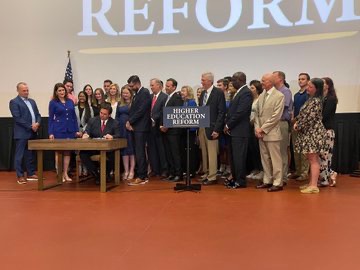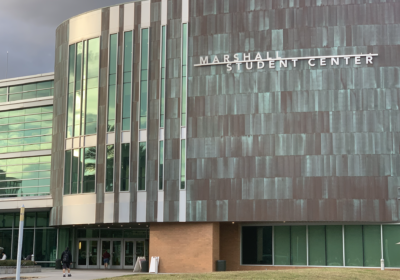USF College Republicans express approval of DeSantis’ recent investigations

USF College Republicans club supported Gov. Ron DeSantis’ recent investigations into USF’s diversity, equity and inclusion (DEI) initiatives and gender-affirming care data, according to club president Justin Prewett.
DeSantis announced his plans to defund DEI and critical race theory (CRT) initiatives in Florida’s public universities on Jan. 31. Shortly before the announcement, a memo was sent to public universities requiring them to send information regarding students who have sought gender-affirming care in the last five years.
Prewett said he agrees with Gov. DeSantis’ recent proposals and investigations on Florida college campuses because the initiatives don’t serve a purpose and only create division among students from different backgrounds.
“I don’t speak for all college republicans, though I do think there is a pretty general consensus among us that we are for what the governor is doing,” he said. “We don’t really support these diversity, equity and inclusion programs on campus. Speaking for myself, I believe that they are unnecessary. I think they’re a waste of resources [and] funds.”
Prewett said the prevalent idea that racism is woven into the fabric of America is a divisive way of viewing society. CRT demonizes white people and pushes a lot of false narratives, according to Prewett.
“I think that that’s just [a] very racialized theory [and] they’re trying to push it into the curriculum,” he said. “The entire premise of [CRT] is based on falsities, so I don’t think that those things should be taught in public schools. I don’t think they should be pushed.”
USF has reportedly spent the most on costs related to DEI and CRT of any public university in Florida, totaling $8.7 million. Of that amount, $2.5 million came from state funds, according to a Jan. 31 Oracle article.
Prewett said there are more effective ways the university could have utilized state funds that were applied towards DEI and CRT, such as increasing the amount of buildings and tutoring centers on campus. He said the money should be funneled back into the students and their needs in the academic sphere.
“These programs supposedly want to promote equality, but if you genuinely want to promote equality, you can’t funnel millions [of dollars] into programs that only help one set of students. That’s not equality. Equality would be funding programs that help all students,” he said.
Racism is not as prevalent in American society, especially at USF or any college campus, according to Prewett.
Most college campuses across the U.S. tend to lean liberal, according to Prewett. He said the idea that minorities face racism wherever they go, especially at college campuses, is not based in reality.
“I’m a minority myself and I’m friends with a lot of other minorities. We just don’t feel this way. We just don’t feel this way about campus. We don’t feel this way about American society,” he said.
Prewett said if these programs were necessary to help minority students, people would see minorities from all across the political spectrum utilizing these resources. He said there would ideally be conservative, libertarian and moderate students of color using these resources.
“The reality is that the ones utilizing these programs are left wing students who see politics through a racialized lens, and that’s the reason that they utilize these programs, because they see race in everything,” said Prewett.
In contrast, junior English major Janiah Gonzalez said that campus diversity initiatives are a way for students of color to meet other people like them, creating a sense of community.
“I am Hispanic, [and as a person of color] I think that losing that funding will negatively affect us. It just gets rid of being able to meet people of the same background,” she said.
“Especially for Hispanic people. We have international students who [might] not know English very well [and] those programs help [them] connect with Spanish-speaking people who have been in the U.S. longer. It helps them find a group of people to connect with, if you get rid of that you’re kind of just leaving all these people to fend for themselves.”
The USF Health branch has agreed to DeSantis’ requests, stating that they are required to fulfill the demands of the State as long as they don’t disclose any personal information of the students, according to a Feb. 3 Tampa Bay Times Article.
Some students said they fear the implications this will have on transgender students on campus and have held protests against DeSantis’ investigation, according to a Feb. 1 Oracle article. On the other hand, Prewett said The College Republicans feel that since DeSantis’ petition is not requesting Florida universities to disclose any personal information, it is not a violation of anyone’s privacy or rights.
“There’s millions of dollars going into these diversity, equity and inclusion programs, so it’s definitely possible that there’s public funds being used on [these] gender-affirming care programs and surgeries for the students on campus,” he said.
This is a problem because gender-affirming care is an incredibly divisive issue, according to Prewett. He said people often assume that gender-affirming care is driven by approval from health professionals rather than profit.
“I think COVID-19 [as an example] really exposed the greediness of the health care community in this country … it’s not like we didn’t already know that they were very greedy,” he said.
“But I think it really just showed how far our healthcare professionals are willing to go to lie to us and to promote care and medicines that aren’t actually effective, just because it’ll just because it’ll make them money.”
Prewett said he didn’t understand how DEI programs were helpful since they only created division among students and fomented the idea that everyone is different.
“We’re all in this together, quite literally. We’re all on the same campus, with the classes and professors,” he said. “But they want to continue pushing the idea that we have differences. [The] truth is that we have a lot more commonalities than differences.”






